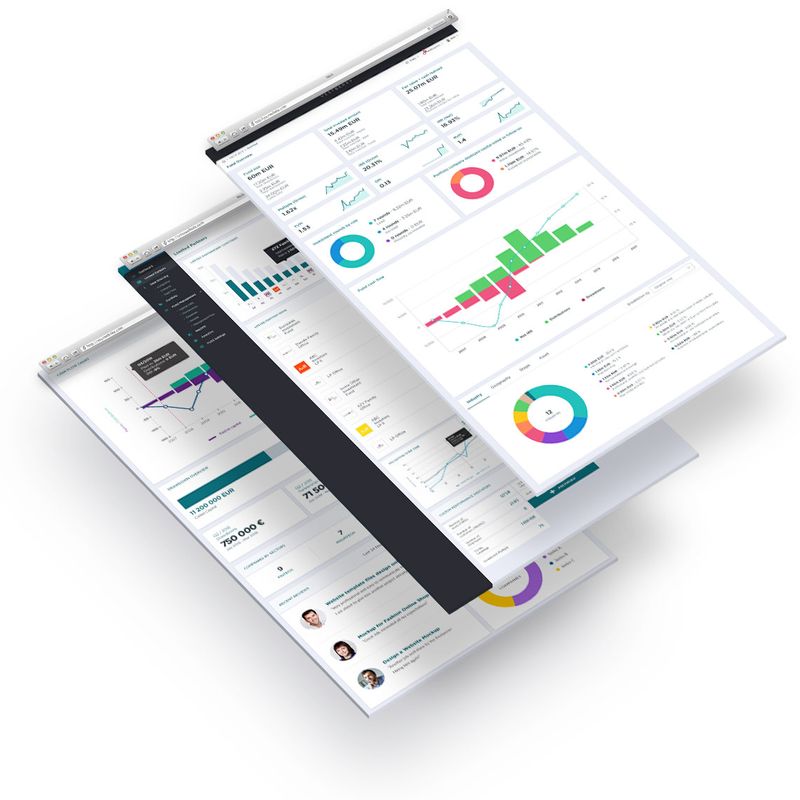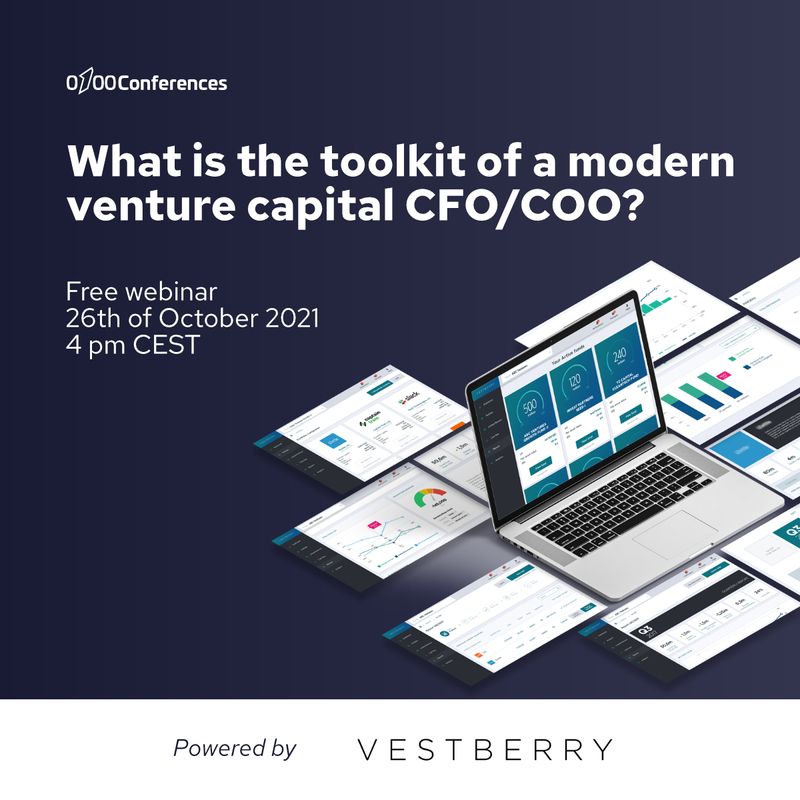Travel restrictions, remote jobs, doing business and even having lunches virtually are our new reality. Looking back on the past year’s challenges, the COVID-19 pandemic has meant an increased dependence on digital technologies, which has grown into huge changes in all spheres of human life. Family, business, health are affected and we are already used not only to surviving but also staying comfortable in that new environment. The Venture Capital industry has also been changing the landscape, and we are currently able to observe the huge impact of digital transformation, data-driven approach AI. We do feel that Venture Capital funds must digitally transform to compete, but what is the correct way to do this?
To better understand top trends and challenges in the industry, 0100 Conferences had a talk with Marek Zamecnik, CEO of VESTBERRY and here you can find some of the ideas that Marek shared with us during the interview.
What key trends and challenges do you see in managing venture capital firms for upcoming years?
Last year was quite a challenging year for venture capital. We have witnessed not only the competition grow more intense but the venture capital game has gotten also tougher. Scores of new capital emerged and also the sizes of funds started to grow with its increase in the number of venture deals. As the market has been becoming larger and tougher, we could also see rising demands to focus on diversity to shape investment decisions going forward. We see trends to push for women in VC so it can gain much-needed traction and significantly increase the value. It is a persistent problem in the VC of the last few years as we are lacking diversity in investors. Diversity is going to be the main challenge of the upcoming years as it is not only about gender diversity but also about racial diversity. Based on the latest research studies, this men-dominated environment in VC industry heavily weighted representation led to skewed results in terms of which entrepreneurs got funded.
Another challenge we see is the digitalization itself when it comes to venture capital firms. Many small VC funds, in some cases surprisingly also the big VC funds known worldwide, are underperforming in means of portfolio monitoring and reporting. To this day, the majority of VC firms rely on traditional manual processes, which are mostly outdated. They still operate on Excel spreadsheets as this solution appears to be easy to use and it is pretty much the most accessible tool among all. As deals and decisions are being made at a very fast speed, in order to keep up with this trend, digitalization within the VC industry should be inevitable.

What are the core principles of venture capital portfolio management and reporting?
One of the core principles of VC portfolio management and reporting is to assign a partner, ideally CFO, who takes care of the total portfolio in each portfolio. At the same time, others should think about their portfolio companies. It is essential to realize that a portfolio is much more than a collection of individual companies, and someone has to look at the portfolio from a bigger perspective. Another vital principle would be to get the portfolio decision-making model right. All partners should be aligned on the decision-making model. Different teams make decisions differently, and it is important to deploy investors’ capital in high-risk investments. Last but not least, you need to get the correct data right. It is essential to have seamless managing and reporting software in place to offer you real-time analysis and adaptability. One of the most significant advantages of portfolio management software is portfolio risk assessment, which might help you evaluate potential risk factors.
What does “data-driven approach” mean to venture fund portfolio management?
Venture capital funds tend to be considered as an industry that is at the forefront of innovation, but their data-driven approach is sometimes broken and insufficient. While they certainly review various data points and metrics before deciding to invest in a startup, the data can often be inaccurate. Although the data-driven approach can be considered as a major competitive advantage, its accuracy in fund portfolio management becomes more crucial as decisions of funds are based on data rather than opinion. We see a trend when venture funds are gravitating towards strengthening their efforts on data quality by setting up a data governance policy from the very beginning. It includes data definition and ownership, indicators calculation, golden source of trust or data quality tools. I believe that setting up the right tool to monitor the data in the right quality, volume and velocity is the way where all venture capital funds will go in the future. A layer of accuracy can be added when implementing portfolio management and reporting software within the venture fund such as VESTBERRY.
What are VC funds' top challenges with portfolio reporting and management? How are they tackling them?
One of the top challenges VC funds currently face is that they manage their portfolio in Excel which causes that VC funds don’t have a single source of truth. VC funds do not keep all the important data and files in one system and they source their data from portfolio companies usually from pre-defined templates that need to be filled out. The data from portfolio companies is collected usually via email or call. These multiple streams of data inputs are prone to error, lack transparency, and last but not least, are time-consuming. Another challenge is reporting to limited partners (LPs) as it is also time-consuming to put together a report in suitable quality to LPs while being ILPA or Invest Europe compliant.
What are the key innovations VC/PE firms should consider implementing in order to stay more productive?
As mentioned earlier, I believe that the digital transformation of venture capital and private equity firms should be the direction of the upcoming years. It gives an edge in terms of making portfolio acquisition decisions, driving revenue growth, and also streamlining internal record keeping and regulatory reporting. Not only that, the digital transformation gives a firm a competitive advantage. It might not be easy for funds to digitally transform but is essential if they are to compete in the new world. As it is not an easy process to embrace digital transformation, the sooner the better. There are many innovations VC/PE firms should consider implementing. One of them is APIs, which could generate new business via mobile apps and the cloud. Another enhancing form of digitalization, equally important, is a platform, that can reconfigure the producer-distributor-client relationship and foster it. Platforms, such as VESTBERRY, offer virtual data rooms where limited partners can access data in real-time or check risk positions. It also provides a possibility to keep a record of transaction record organized and automated.

What's the state of innovation in terms of VC data governance, portfolio management and reporting in recent years? If any, what trends are shaping these innovations?
The state of innovation of VC data governance, portfolio management and reporting has come a long way so far but still has an even longer way ahead. According to a survey during our recent webinar on “What is the toolkit of a modern venture capital CFO/COO?”, the majority of attendees answered that they foresee digitalization within VC funds as the main challenge in the future and that their funds' are digitalized only from half. We can see VC funds shifting from using multiple excel spreadsheets or cloud collaboration service tools for their portfolio monitoring and reporting to more complex and innovative platforms. These platforms, when picked the right one, serve as a single source of truth and general partners can keep all the important data and files in one system, while having every process automated. This way general partners can prevent human error or lack of transparency while sourcing and analysing data.
PE and VC firms now have to consider new ways to incorporate ESG into dealmaking according to new EU regulation. How will it affect their day-to-day operations?
Soon, ESG metrics will be mandatory data VC/PE funds will have to report based on the regulation of the European Parliament which means funds need to set up and customize metrics for each portfolio company. Investment professionals have a growing need to access the sustainability data of private companies in their portfolio in order to achieve better risk-adjusted returns. With ESG metrics, VC/PE firms can identify ESG and business conduct risks and exposure in private investments to create a holistic view of risk across their portfolio. As consumers are making more socially and environmentally conscious choices, investors are looking to support the funds and companies that drive positive change. I believe that the trend of implementing ESG metrics into dealmaking reflects a larger shift toward greater awareness of its impact.
COVID-19 increased cybersecurity attacks and data breaches. What are the most common security threats facing VC funds, how to predict them and select the right platforms and software to cooperate with?
As the pandemic upended the threat landscape as we know it, we have been witnessing quite some cybersecurity attacks and data breaches. It is characterized by a pattern when one breach can cripple tens or even hundreds of organizations. One of the most common security threats VC funds have to face are stealing personal information on the company’s limited partners. This happens once the data are stolen from the serves before the files are encrypted. The situation can go even further as cyber attackers can threaten to publish those files online if the ransom to decrypt the files is not paid.
According to SS&C Intralinks 2022 LP Survey "GPs are still not hitting the mark when it comes to using technology to improve the reporting experience ... Most investors surveyed (67%) feel that more could be done. This remains an ongoing challenge for GPs …" What is your take on this, why the majority of LPs are only moderately satisfied with GPs’ technology prowess with respect to reporting? What can be changed? What is your outlook?
We are in the area where most GPs slowly start to realize that applying the right tool for portfolio managing and reporting is necessary. Researching the current market opportunities and having someone internal who would manage the tool should be part of the business strategy. Portfolio managing and reporting is a complex in-house project which requires special attention. Collaboration and feedback from LPs and GPs are crucial for software developers when developing the right reporting tool. To create the right tool, we must be sure we are aligned with the current market needs. Lastly, it is a huge challenge to satisfy the needs of all investors since everyone has different ideas of how they want the reporting to look like. To align and create one tool that would fulfill the needs of most investors on the market is a big challenge.

0100 Conferences has organised together with VESTBERRY an online educational webinar for CFOs and COOs in the Venture Capital industry. We are sure you have more questions to be asked and ideas to be shared with your peers after this brief interview. Therefore, come and join us on 26th October at 4 pm CET at the webinar "What is the toolkit of a modern venture capital CFO/COO?". During the event together with the Speakers from Verdane, Chalmers Ventures, Elaia and Flashpoint we will cover all the current hot topics and challenges regarding the innovations in the back office for CFOs in managing venture capital firms for upcoming years. This practical webinar will provide you with lessons learned and valuable tips shared by top players.



